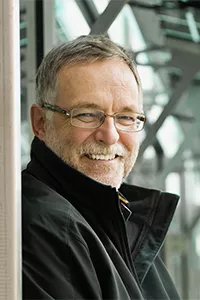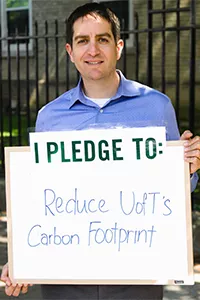
From climate action to social justice, U of T accelerates tri-campus sustainability efforts
From climate action to social justice, the University of Toronto is taking major strides to incorporate sustainability into every facet of the institution – capitalizing on its position as one of the world’s top public research universities to help meet a key global challenge.
The latest report by the President’s Advisory Committee on the Environment, Climate Change and Sustainability (CECCS) details how U of T is rapidly driving sustainability initiatives across its three campuses, with the United Nations’ Sustainable Development Goals (SDGs) serving as a guide. That includes everything from the creation of an Institutional Strategic Initiative (ISI) focused on clean-energy research – the Climate Positive Energy Initiative – to the launch of new “sustainability pathways” to help students explore sustainability from various academic perspectives.
The report follows U of T’s recent commitment to divest from investments in fossil fuel companies – both directly and through pooled or comingled investment vehicles – by 2030 and achieve a climate-positive St. George campus by 2050.

“As I indicated in my recent announcement to divest from fossil fuel investments and create a climate-positive campus, in light of the increasing urgency of the climate crisis, this is an opportune moment to commit to even more ambitious carbon reduction goals for the university’s long-term investments,” U of T President Meric Gertler said in a letter introducing the report.
“It is also time to accelerate our action on the SDGs, including but going far beyond SDG 13 for climate action.”
The committee, which late last year had its mandate extended to December 2023 and its budget doubled, outlined its accomplishments and goals across its four sub-committees – teaching and learning, research, operations and engagement, and partnerships – in a 143-page report shared with Governing Council on Dec. 16.
John Robinson, co-chair of the CECCS and the president’s adviser on the environment, climate change and sustainability, said he’s heartened by how quickly awareness of – and responses to – climate change and other sustainability issues are accelerating at the university.
“Things are really moving pretty quickly,” he said. “It’s a big institution so it’s like a supertanker that has a long turning radius [but] things are really happening in a big way.”
Case in point: an Ontario Chamber of Commerce policy report recently included U of T as a case study, calling the university “a global leader in demonstrating and promoting sustainability.”
Robinson added that the COVID-19 pandemic has highlighted the extent to which issues such as social justice and equity intersect with efforts to tackle climate change and environmental damage.
“The pandemic has brought to the forefront a recognition of what’s always been true but has been ignored for too long – that when it comes to sustainability and climate change, there are these huge ethical issues around social justice, equity, diversity and inclusion that have to be addressed and made front and centre,” said Robinson, a professor at the Munk School of Global Affairs & Public Policy and the School of the Environment.
“We can’t deal with these sustainability issues without also dealing with issues of social justice, equity and diversity.”
Accordingly, the CECCS report outlines several ways in which U of T divisions are looking to address issues around equity and diversity. They include: Procurement Services diversifying its supply chain to provide more opportunities to businesses owned by people from under-represented groups; the John H. Daniels Faculty of Architecture, Landscape, and Design’s employment and mentorship program for Indigenous youth; and the CECCS itself expanding its membership by appointing a seat for an Indigenous staff member.

Earlier this year, U of T also announced that Ron Saporta, chief operating officer, property services and sustainability, would join Robinson as committee co-chair, a move designed to strengthen the academic-operational co-operation needed to make headway on U of T’s sustainability goals.
There is even a new institutional strategic initiative, called Sustainable Development Goals @ U of T, that’s aimed at advancing the 17 sustainable development goals at the university – an idea borne from last year’s “17 Zoom Rooms @ U of T” virtual event. The online brainstorming session brought together graduate students, post-doctoral researchers and professors who underscored the need for more cross-disciplinary and inter-institutional initiatives at the university. The session led to the creation of an ISI focused on SDGs, which will define the formal vision for an inter-disciplinary research and education network, forge relationships, secure funding and create a roadmap.
“I think it’s a brilliant move on the part of U of T to create these horizontal linkages through the ISI program,” said Robinson, who sits on the SDG ISI’s steering committee. “We’re used to being in our disciplines, in our divisions, in our departments in a more vertical set of silos – so this is a real attempt to create horizontal connectivity.”
Beyond U of T, the university has sought to create connections with likeminded institutions in Canada and across the world on sustainability issues. That includes pledging, as part of the U7+ Alliance of World Universities, to take action on COP26 goals and calling on the G7 to recognize universities’ capacity to help tackle pressing global issues such as climate change, the economic recovery from COVID-19 and championing social justice.The university has also taken steps to mobilize students, faculty and staff through events such as the Adams Sustainability Celebration, which comprised virtual showcases; the awarding of grants and prizes to support sustainability-focused courses and projects; and virtual panels. One session saw Saporta and Marc Couture, director of sustainability and energy management, review U of T’s sustainability goals and the actions being taken to reduce greenhouse gas emissions on the St. George campus.
Yet another example is U of T’s involvement with the Urban Climate Action Network (UCAN), an initiative within the University Climate Change Coalition (UC3) that will see six universities partner with their host cities to help them achieve their climate targets. Among the initiatives under the U of T node of UCAN: more than 50 graduate students from the Munk School of Global Affairs & Public Policy will be working on projects with TransformTO, the climate action strategy overseen by the City of Toronto’s Environment and Energy Division.
“These aren’t projects that we dream up in the academy – these are actual projects that people in the city say they could use help on – so, I’m really excited about that,” Robinson said.
CECCS is also exploring further opportunities for U of T students to contribute to climate action through curricular and co-curricular initiatives.
“There are very ambitious targets that have been adopted by City Council, but the question is how do we achieve them? How do we, for example, retrofit every single building in the city of Toronto to net-zero or better by 2050? How do we make every new building built in the city after 2030 net-zero or better?” Robinson said. “These are massive targets. So, the question is: How can we as a university get involved in this process, get engaged and contribute to reaching these vital targets?”
Robinson says part of the answer will involve engaging with private sector players, particularly on building and retrofit projects.
The committee is also looking to expand opportunities for students to work on sustainability projects on campus and with external partners through “Campus as a Living Lab” and “Community-Engaged Learning” initiatives.
“Our goal is to have 1,000 students a year doing sustainability-oriented ‘Campus as a Living Lab’ projects and 5,000 students doing sustainability-oriented ‘Community-Engaged Learning’ projects with partner organizations,” Robinson said. “That’s one way that students can get deeply involved while they’re here – and we want to make more of those opportunities available.
“We believe strongly that students can take an essential role in these matters and provide leadership.”
Robinson added that the committee is developing workshops aimed at helping students address “well-justified” anxiety about the future that awaits them and the planet. The sessions would cover topics such as how students can foster sustainability in their future workplaces and offer examples of best practices and creative approaches that have been deployed by individuals to help change organizations.
“We feel that to simply suggest to them that they should consume less or recycle more doesn’t really address that anxiety in a very positive way,” he said. “So, we’re planning to develop workshops that will be about how to become an ‘agent of change’ after you graduate.
“We think the idea of green jobs doesn’t make any sense because every job is in the world and involves people, so every job in the world has sustainability dimensions. Every graduate of the university can add a sustainability dimension to their work life.”
Robinson said he tries to help students to view the daunting challenges posed by climate change as opportunities.
“We think this is an incredible opportunity to actually re-make the world in a better way. It’s not a trivial, simple or easy challenge … but it is an opportunity. I tell my students: You’re the generation that gets to fix this problem because this is when it has to be done – in the next few decades.”
